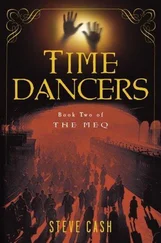In the following days, I adopted the general look and attitude of a post-war American kid. It was easy. The look, which I liked, was simple — white T-shirt and blue jeans — and the attitude of the American twelve-year-old seemed to never change.
I silently hoped I would hear from one of the Meq, especially Opari. It didn’t happen, although I did dream about her on five consecutive nights. They were all vivid dreams in faraway places, places I had never seen. Opari knew all the paths, trails, springs, valleys, caves, and beaches. In one of the dreams, under a broad bright night sky, she pointed out the stars and configurations of several new constellations. We held hands and whispered together, listening to the sound of the wind in the trees. Dreaming about Opari was one thing, but I also knew I could not let thoughts of her into my life on a daily basis. In my heart of hearts, I believed she was safe and would return to me eventually. The Itxaron, the Wait, deepens with the passing of time, and longing for your Ameq only makes it worse. Geaxi once told me there is an actual physical condition, a kind of paralyzing psychic ache, which the Meq can develop from excessive longing. The Wait is also a very real weight for the Meq, and it becomes heavier and heavier until we cross in the Zeharkatu. Above all, Opari and I were aware we must be present at the Remembering, wherever it was, and we must be there with our Stones. There was no option. Until that time, the Wait would continue.
Antoinette was expected to arrive by train on December 20. Carolina wanted to meet her at Union Station. She also wanted to wait for Antoinette before purchasing and decorating a Christmas tree. On the morning of the nineteenth, the temperature dropped rapidly and a cold front moved through St. Louis, bringing with it an inch or two of light snow. It wasn’t much, but it was enough to change Carolina’s mind about waiting to put up a Christmas tree. By midafternoon, Mitch and Mercy had found a suitably sized tree and by sunset the tree was decorated and lit with multicolored lights strung among the branches from top to bottom. After dinner, Carolina asked Mitch to turn on the phonograph and play some music, but not Christmas music. She said she wanted to dance and suggested a nice waltz by Strauss. Mitch picked out a few records and turned up the volume. Carolina looked at me. She removed her shoes so she could be closer to my height, then extended her hand for me to take. “I assume you know how to waltz, Z.”
I had never waltzed in my life, but I wasn’t about to admit it. “Of course,” I said, and before I knew what was happening, we were gliding and spinning in wide circles around the big living room. Mitch and Mercy joined us, laughing loudly at my awkward attempts to be graceful. Carolina and I started laughing along with them. We were all dizzy with dancing and music and Christmas lights.
Then I saw her. She was standing ten feet from the Christmas tree staring at me with her mouth open. She wore a big Navy pea jacket with the collar turned up, dark slacks, a plaid muffler wrapped around her neck, and a red beret. She was taller than her mother, but she had her mother’s eyes. And she was beautiful. She reminded me of the young American singer and actress Lena Horne.
I stopped dancing and stared back at her. I knew why she was staring; I had witnessed the same thing before on the faces of many Giza who had heard of the Meq all their lives, yet never actually seen one of us in the flesh. I took a step toward her. “Antoinette?”
She nodded her head a few times without speaking, then swallowed and said, “Yes, I am Antoinette.” She spoke English with an American accent, and sounded just like Emme. “Are you … are you—”
“My name is Zianno,” I said, walking over to her. I took hold of her hands. Her fingers were nearly twice as long as my own. I looked up into her eyes. I liked her immediately. “Call me Z,” I said, squeezing her hands slightly. “I knew your mother and father well. We were great friends, and your mother saved my life on many occasions.”
Finally, Antoinette seemed to relax. “I know,” she said. “However, I have always heard it the other way around.”
I smiled. “You are early. We expected you tomorrow.”
“Yes, dear,” Carolina said from behind me. “Is anything wrong? We wanted to meet you at the train station and welcome you back.”
Antoinette gave Carolina a kiss on both cheeks. “A friend of mine was driving home today and going through St. Louis,” she said, removing her beret, muffler, and pea jacket. “I asked if I could ride along. I wanted to surprise you and Uncle Mitch.”
“And you did,” Mitch said, coming over to Antoinette and hugging her tightly. “Welcome home, honey.”
Antoinette turned to look at the Christmas tree, which blazed against the darkness outside the window. Suddenly tears welled up in her eyes. “I have never seen anything more wonderful in my life,” she said. “It is …”
Carolina slipped her arm around Antoinette’s waist and smiled. “Merry Christmas, my dear, Merry Christmas.”
Jack never did make it back for the holidays. He sent a postcard from Panama apologizing and swore he would be home by baseball season. Carolina was disappointed, but her spirits rose when she received a telegram on the twenty-second. Star and Caine and Willie Croft were setting sail for New York on January 1, then coming to St. Louis by train — a complete surprise to Carolina and she was ecstatic. I was excited by the news because I hadn’t seen any of them in years. Antoinette mentioned that she had met Mr. Croft once, briefly, in Marseille. “He was a complete gentleman to a very young and silly girl. He gave me an enormous piece of the most delicious chocolate.”
“That’s Willie, all right,” I said, then I had a curious thought. I asked Carolina, “How old is Caine now?”
“He’s twenty-seven,” she answered. “Why do you ask?”
I shrugged. “No reason.”
On Christmas Day snow fell throughout the afternoon and Mitch played Scott Joplin tunes on the piano until late into the night. Mercy sat on the piano bench next to him, tapping her foot to the music. Carolina reminisced about the great musician, good friend, and humble human being he had been. Antoinette was familiar with ragtime music and wanted to know everything about him. I was amazed at how well Mitch could still play, and I loved hearing the music again. It reminded me of old St. Louis. I thought of Solomon laughing somewhere in the big living room when it was filled with expensive whores and the smell of cigars and the sound of poker chips and playing cards and silver dollars and all the time a piano in the background. I could hear him laughing and swearing when he lost, cheering when he won, leaning over and telling me with a wink, “Zis is good business, Z.”
We awoke the next day to bright sunshine and a snow-covered city, though the streets were open and busy with traffic. Over breakfast Carolina said she wanted to go for a long walk in Forest Park. She wished Antoinette to see the sheer beauty of the place, especially after a decent snowfall. It was during this walk that a relatively minor incident provoked me into using the Stone. I hadn’t needed to use it since before the war when Sailor and Sak and I slipped into northern Japan. The incident would also be the first time Antoinette witnessed the silent, mystical power of the Stone of Dreams.
Entering the park from Lindell Boulevard, we followed the few paths that were clear, making our way south with no particular destination in mind. The park was nearly empty, but the absence of people only made everything more beautiful and surreal. As we neared the southern boundary, we passed by the Jewel Box — a unique art-deco-style conservatory, made entirely of glass and steel, with stone at the base and concrete framing the entrance. Standing alone against the snow, the building glistened in the sunlight.
Читать дальше












